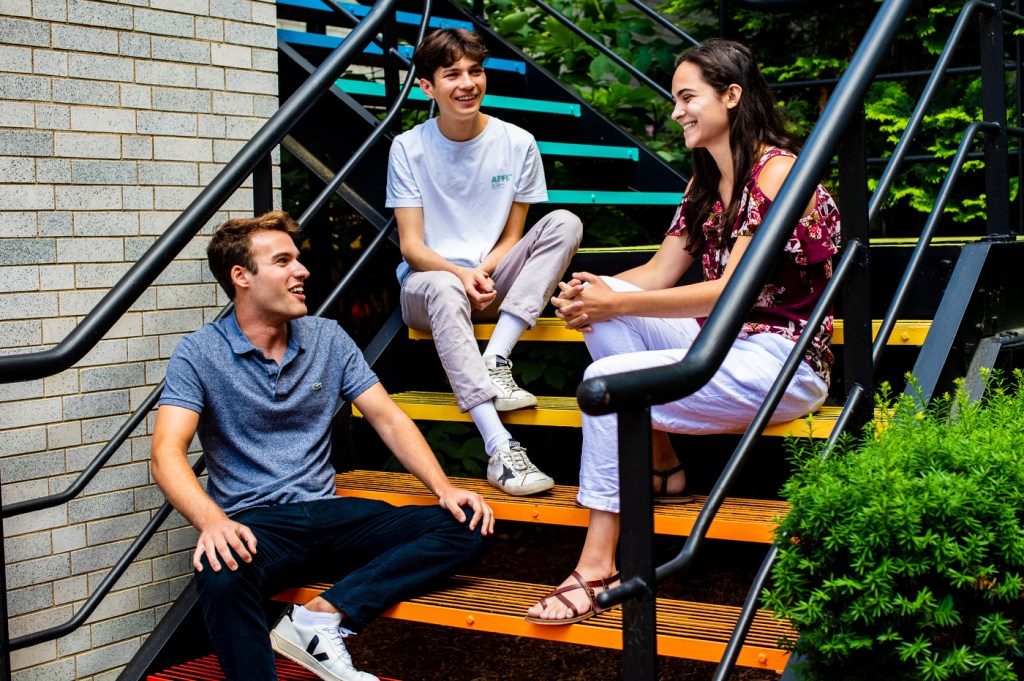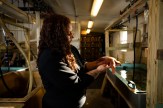What does it mean to be Out in Business? This club makes space for queer business students to find out.

Sabrina Pangione noticed it in her first-year finance course.
“It was a weird feeling,” says the business student, now in her fifth year. “I felt like, ‘Oh, I belong here because I like finance, just like everybody else does, and we all want to work in the same industry.’ But there was something missing.”
Looking around, Pangione wasn’t sure whether anyone else in the room was a member of the queer community. Maximillian Rampulla also noticed it in his business classes. “I didn’t see myself reflected in my peers very often,” he says.
So, in February 2020, Pangione, Rampulla, and two friends and fellow business students at Northeastern teamed up to revive a dormant LGBTQA student organization in the D’Amore-McKim School of Business that could fill that void. The organization, called Out in Business, quickly gained members and now, nearly a year and a half later, counts about 60 students among its ranks.
“Having this space to talk about that kind of stuff with business students is very beneficial because then you know that you’re not alone,” says Pangione, who was vice president of operations for Out in Business during its first year. “It’s one thing to talk to a coworker who is an ally or talk to another classmate,” she says. “But it’s another thing to be able to talk to someone who has experienced firsthand exactly what you’re experiencing.”
“In other clubs, the shared experience is that we signed up,” says Michael Ambrozia, one of the co-founders who was president of the student organization for its first year. “Whereas in Out in Business, those shared experiences aren’t just because we’re all part of the same club. It’s that we all share a unique identity. It’s really that shared personal experience.”
Although the students were just beginning to launch Out in Business when the COVID-19 pandemic swept into the U.S. and forced everyone online, Ambrozia, Rampulla, Pangione, and fellow co-founder Brian Miller simply pivoted to the virtual space. Out in Business has an active Slack channel, hosts bi-weekly meetings over Zoom, connects on Instagram, and has found many other virtual ways to connect with one-another.
The bi-weekly meetings oscillate between what now-club president Rampulla, who was the vice president of marketing for Out in Business for the first year, calls “social meetings and professional meetings.”
Sometimes the group hosts representatives from industry leaders for workshops and talks about the industry or how to stand out as a job applicant. Other gatherings are more more informal, focused on connecting with one-another, alumni, or other industry professionals who are queer, and sharing stories and strategies for how to handle discrimination in the workplace. Out in Business has also held their own case competition, in which members formed small teams to develop mock business plans.
For Rampulla, a fifth year student, Out in Business has offered an important space for business students to talk about identifying as a member of the LGBTQA community in the workplace.
“I think it’s easy for us, as students in a Northeastern bubble, to think that it’s not as hard to be queer anymore, but once you talk to people that are actually in the workforce, it made me realize why we need this club and help me understand for myself,” he says.
Hearing a Northeastern graduate talk about microaggressions that they had experienced at work prompted Rampulla to reflect on an interaction he had with a coworker during a co-op.
“A coworker said, ‘You remind me a lot of my gay friends’ and did an imitation of a gay person [stereotype],” he recalls. “I didn’t recognize it at first, but it sat kind of funny with me.” And after hearing a graduate speak about how her identity as queer is not supposed to be a point of conversation or judgment in the workplace, rather she is supposed to be judged by her work, “it made me realize why I felt uncomfortable with that.”
Another topic that comes up frequently in the group is whether (and when) to come out to coworkers or employers. Do you put the club on your resume? Do you bring it up in a job interview? Do you decide to hide that part of your identity?
While the decision to share one’s identity is a personal one, based in part on how safe a person feels in their environment (among other factors), members of Out in Business say they’ve felt empowered by the choice to be open in their jobs.
At a co-op two years ago, Ambrozia opted to keep his sexual orientation private. But when he returned to the same place after co-founding Out in Business, his perspective shifted from “I don’t really want anyone to find out,” he says, to “I want people to know this about me. I want it to be a part of who I am. And if they don’t like it, then I don’t like the company.”
He took the same approach into a job interview this year, coming out during the interview to a potential supervisor, pitching his identity as part of what he would bring to the role (a marketing job). Of that experience he says, “I got the job.”
Pangione is proud of how far the organization has come in just a year and a half, from just four people connecting virtually.
“Our last meeting of last semester” started as an organized discussion in small groups, she says. But the entire group ended up coming together and watching music videos, many of which were by LGBTQA artists.
“It was pretty fun to see everybody coming together as a community and listening to these and laughing together,” Pangione says. “It was that moment where I was like, ‘OK, this is working. People are really enjoying this organization.’”
For media inquiries, please contact media@northeastern.edu.





